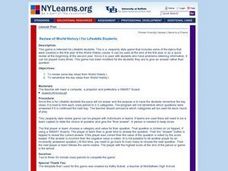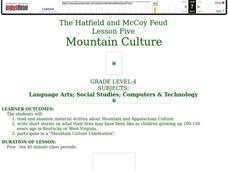Mr. Nussbaum
Cash Out – Online Game
Third graders play a computer game related to money. In this money lesson, 3rd graders have to give a customer change. They see how much money is needed and have to choose the coins to make that amount.
Cincinnati Library
Computers for Beginner
The kids in your class are probably experts at navigating the computer, but do they know the difference between hardware and software? Teach computer skills to any level of computer user with a helpful reference sheet. It...
Curated OER
Playing with History
Students consider the elements that make computer games compelling, then use these elements to develop game 'narratives' based on historic events.
Concordia College Archives
History and Musical Aesthetics
What are the musical elements that characterize a school's fight song or its alma mater? Class members listen to examples of fight songs and alma maters from various schools, play a listening game, and then create a list of the...
Curated OER
Human Computer Game
Students view the "Parts of a Computer" Power Point presentation then they view the inside of a computer and break down each operating system and its job. They compare and contrast the difference between human and computer parts that...
Curated OER
The History of Computers
Students study the people and inventions related to computers. They research famous people for each invention they created and create a timeline of the inventor and his inventions. They present an oral presentation about the person for...
Curated OER
Go for the Gold!
The options are vast with this Ancient Greece and Olympics research project! Using Scholastic online resources, historians have interactive and educational supports to guide them through researching and writing about the 2004 Olympics in...
Curated OER
Virtual Realities of War
Learners outline the major events, mat??riel, and setting of a war or conflict. They develop a computer game narrative that draws on these historically accurate details.
Curated OER
Galaxies Galore, Games and More
Students practice skills used in scientific investigation while studying the three main types of galaxies. Students identify Earth as part of Milky Way galaxy, the parts of galaxies, and the types of galaxies, as well as classify...
Curated OER
Technology: Computer Basics
Learners access a variety of resources on the Internet related to basic computer operations and parts. They examine the parts of a computer and the history of computers, view timelines, play games, and read tips on Internet safety.
Center for Civic Education
Women's History Month Word Clouds
What a great idea for celebrating Women's History Month and discovering the amazing efforts that individuals have put forth on behalf of women's rights! Learners take a closer look at the speeches and other primary source documents of...
Curated OER
The Olympic Games
Students research the history of the Olympics and the various countries that have hosted the games. They obtain information about some of the sports featured in the Olympics. Students then create a brochure using Microsoft Publisher.
Curated OER
Hanukkah Fun: The Dreidel Game
Celebrate Hanukkah with an engaging lesson plan about the history of the dreidel! After reading or listening to a short description of the dreidel's place in the Hanukkah celebration, young learners work on their own dreidels from...
Curated OER
"101 Amazing Earth Facts" Game
Students read for comprehension, work cooperatively to learn "101 Amazing Earth Facts," and compete as teams in a Jeopardy-like game.
Curated OER
Parts of a Computer
Students, after identifying the parts of a computer, and categorizing the parts by functions (input, output, process, and storage), explore how all the parts of a computer work together. They compare/contrast the differences between...
ABCya
Thanksgiving Crossword Puzzle
Solve an eight-question crossword puzzle all about Thanksgiving. Players click on rows and columns, read a question, and answer using the given letters. Hints are provided at a point cost.
National First Ladies' Library
Opening the Olympic Games
Learners examine the history of the Olympic Games, including the opening ceremonies. In small groups, they create Olympic flags using symbols that represent their country and communities. In phase two of the instructional activity,...
Curated OER
Review of World History I for Lifeskills Students
Ninth graders play a Jeopardy style game to review World History. In teams, 9th graders choose a category and a value for their question. Students are given an answer, and they give the correct question to match the answer.
Curated OER
Ancient Hawaiian Sports
Pupils discover what types of sports were popular in ancient Hawaii. They investigate the rules for playing the games no longer common in Hawaii. After researching the sports, students play the games and design posters representative of...
Curated OER
The Sporting Life
Students read and discuss "When the Games Began: Olympic Archaeology," examining the significance of the first Olympic Games in Greece. They research and reenact scenes from these Games and reflect on the Games' original importance.
Curated OER
The Wright Brothers on Hollywood Squares
Students test their knowledge of the Wright brothers by playing "Hollywood Squares." They read (or listen) with comprehension. Students follow the rules as they actively participate in a game to test their reading (or listening)...
Curated OER
The Hatfield and McCoy Feud
Learners explore West Virginia history with regard to Mountain and Appalachian Culture. They compare and contrast life now with life 100-150 years ago. They write and illustrate a short story about the life of children 100-150 years ago....
Curated OER
Family Album
Kids of all ages discover their family histories through pictures. First, flip through the PowerPoint provided (or consider making one of your own). It should show pictures of your family and have clear, easy to understand sentences that...
Curated OER
Olympic Obstacle Course
Students examine the obstacles that Salt Lake City must overcome to host a successful Olympics in 2002. They draft proposals for their own city and/or state to host future Olympic Games.

























